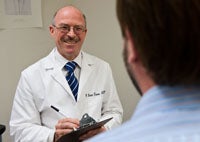In Vino Vitalis? In Wine There Is Life?

Posted in GUMC Stories
 The expression in vino veritas — “in wine there is truth” — amuses R. Scott Turner, M.D., Ph.D., but he is more prone to quote in vino vitalis — “in wine there is life.”
The expression in vino veritas — “in wine there is truth” — amuses R. Scott Turner, M.D., Ph.D., but he is more prone to quote in vino vitalis — “in wine there is life.”
That’s because Turner, Director of Georgetown University Medical Center’s Memory Disorders Program, knows that resveratrol, (a compound found in red wine and red grapes), when used as a treatment of laboratory animals, lowers risk of diseases of aging — thus, prolonging their health and lifespans.
Human trials of resveratrol are now underway for a variety of aging maladies, including a new national study that Turner is leading.
Turner has designed a clinical trial to test whether high doses of resveratrol are well tolerated and whether they can slow the progression of dementia in individuals with early Alzheimer’s disease.
 In this federally funded $4 million study, to be conducted with 120 individuals at 26 academic medical centers across the U.S., investigators will test daily doses of resveratrol equivalent to that found in about 1,000 bottles of red wine — preferably a pinot noir from Oregon which Turner says contain the highest levels of resveratrol.
In this federally funded $4 million study, to be conducted with 120 individuals at 26 academic medical centers across the U.S., investigators will test daily doses of resveratrol equivalent to that found in about 1,000 bottles of red wine — preferably a pinot noir from Oregon which Turner says contain the highest levels of resveratrol.
He can’t wait to get started. That’s because he has worked to develop the study for more than seven years since he submitted his proposal to the National Institute on Aging (NIA), in collaboration with the Alzheimer’s Disease Cooperative Study (ADCS) group.
Turner reports that resveratrol treatment delays and prevents the onset of Alzheimer’s disease in mouse models with the disorder. Other studies report that resveratrol treatment lowers cholesterol, lowers fat stores, and improves muscle endurance in mice. These are parameters that often drive the development of type II diabetes, which some researchers consider a form of accelerated aging.
The major risk factor for Alzheimer’s disease is aging. “We used to think that aging is a non-modifiable risk factor – but is it?” Turner asks. He cites a number of studies that show caloric restriction can prolong both health and life spans and that, on the flip side, diabetes is a risk factor for Alzheimer’s.
“Investigators have found that Alzheimer’s is somehow linked to metabolism, which is energy balance, and that preventing diabetes by caloric restraint and by exercising regularly in mid-life, may prevent or delay Alzheimer’s in later life,” he says.
Human population studies have often found health benefits from modest consumption of red wine, including a lower risk of dementia. And a recent pilot study of resveratrol treatment in obese men showed improvement in their lipid and glucose profiles.
Delving deeper into the biological thread, investigators discovered that one gene and its protein, SIRT1, is implicated in regulation of aging, and that a compound that appears to promote SIRT1 activity is resveratrol.
Much of this research happened while Turner was developing his resveratrol study, a task that included finding a biotech company that would synthesize resveratrol for the clinical trial. “Resveratrol cannot be patented, so major pharmaceutical companies are not very interested,” Turner says. “Research studies cost millions of dollars to conduct and without patent protection, a pharmaceutical company would be unable to recover their costs.”
Participants in the study will receive either a placebo (a pill that looks like resveratrol but has no active ingredient) or escalating doses of resveratrol. Cognitive tests will be given before and after treatment, and brain volumes will be measured using MRI scans. Investigators will also look at changes in spinal fluid proteins and in overall metabolism (blood glucose and insulin).
Neither the patients nor the clinicians will know if the study participant is receiving placebo or resveratrol until the end of the study.
“This is the gold standard for conducting a clinical study because it allows us to objectively determine if resveratrol may offer any clinical benefits,” says Brigid Reynolds, NP, lead investigator for the study at Georgetown.
While Turner’s national resveratrol trial is underway, others investigators are looking at the compound to prevent or treat cancer, diabetes, and heart disease in humans.
“We think resveratrol may target basic mechanisms of aging, which also tie into metabolism,” he says. “There are a lot of biological black boxes that we don’t understand yet, but are seeking to explain. …and we can’t wait for the answers! The silver tsunami is already here.”
To learn more about the resveratrol study or other Alzheimer’s studies underway at Georgetown, contact Kelly Behan in the GUMC Memory Disorders Program by calling (202) 687-0413 or via email at keb53@georgetown.edu. Information is also available at memory.georgetown.edu. Georgetown study participants must be in the early stages of Alzheimer’s disease, speak English, have a study partner who knows them well, and be willing to undergo examinations, blood tests, MRI scans and spinal fluid collection.
By Renee Twombly, GUMC Communications
(Published May 9, 2012)
